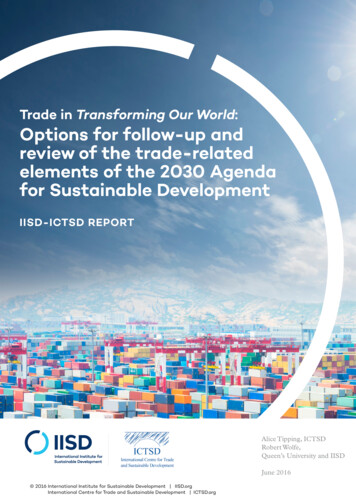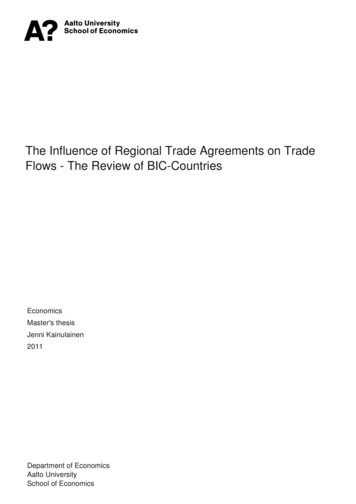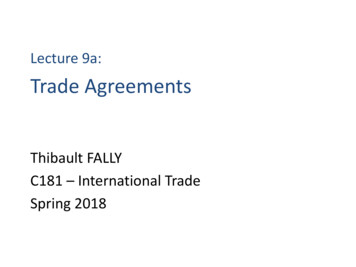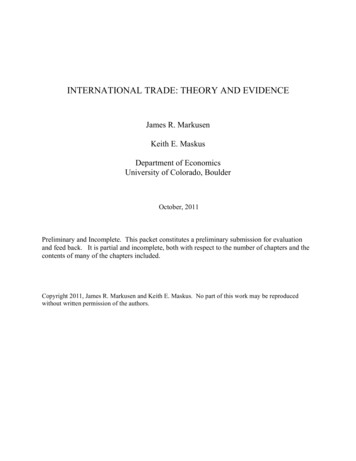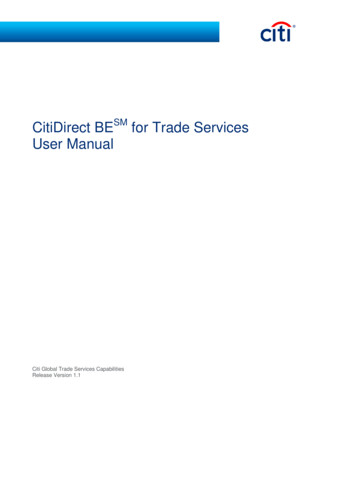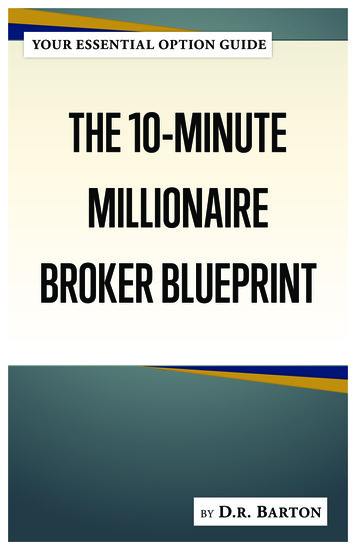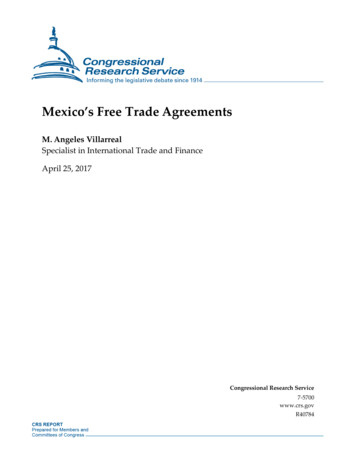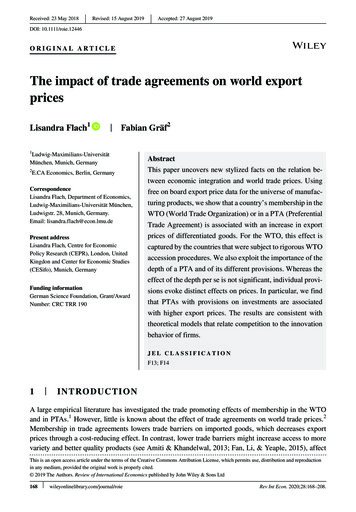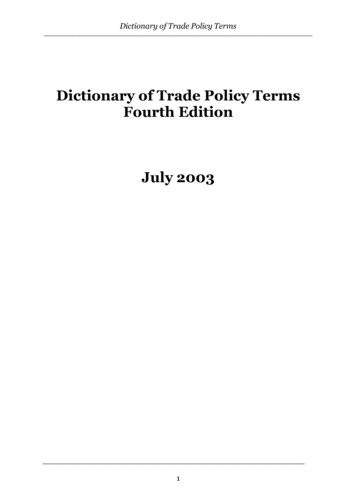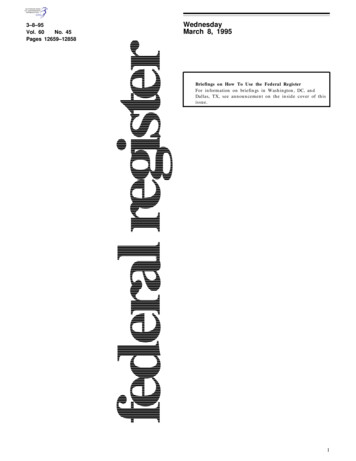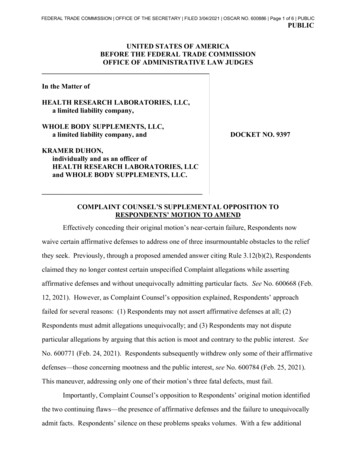
Transcription
FEDERAL TRADE COMMISSION OFFICE OF THE SECRETARY FILED 3/04/2021 OSCAR NO. 600886 Page 1 of 6 PUBLICPUBLICUNITED STATES OF AMERICABEFORE THE FEDERAL TRADE COMMISSIONOFFICE OF ADMINISTRATIVE LAW JUDGESIn the Matter ofHEALTH RESEARCH LABORATORIES, LLC,a limited liability company,WHOLE BODY SUPPLEMENTS, LLC,a limited liability company, andDOCKET NO. 9397KRAMER DUHON,individually and as an officer ofHEALTH RESEARCH LABORATORIES, LLCand WHOLE BODY SUPPLEMENTS, LLC.COMPLAINT COUNSEL’S SUPPLEMENTAL OPPOSITION TORESPONDENTS’ MOTION TO AMENDEffectively conceding their original motion’s near-certain failure, Respondents nowwaive certain affirmative defenses to address one of three insurmountable obstacles to the reliefthey seek. Previously, through a proposed amended answer citing Rule 3.12(b)(2), Respondentsclaimed they no longer contest certain unspecified Complaint allegations while assertingaffirmative defenses and without unequivocally admitting particular facts. See No. 600668 (Feb.12, 2021). However, as Complaint Counsel’s opposition explained, Respondents’ approachfailed for several reasons: (1) Respondents may not assert affirmative defenses at all; (2)Respondents must admit allegations unequivocally; and (3) Respondents may not disputeparticular allegations by arguing that this action is moot and contrary to the public interest. SeeNo. 600771 (Feb. 24, 2021). Respondents subsequently withdrew only some of their affirmativedefenses—those concerning mootness and the public interest, see No. 600784 (Feb. 25, 2021).This maneuver, addressing only one of their motion’s three fatal defects, must fail.Importantly, Complaint Counsel’s opposition to Respondents’ original motion identifiedthe two continuing flaws—the presence of affirmative defenses and the failure to unequivocallyadmit facts. Respondents’ silence on these problems speaks volumes. With a few additional
FEDERAL TRADE COMMISSION OFFICE OF THE SECRETARY FILED 3/04/2021 OSCAR NO. 600886 Page 2 of 6 PUBLICPUBLICsentences, Respondents could have easily withdrawn all of their affirmative defenses and statedunequivocally that the Complaint’s allegations are true. Respondents’ refusal to do sodemonstrates that they do not unequivocally accept that all of the Complaint’s materialallegations are true.1 Because Respondents’ disingenuous nolo contendre approach violates boththe spirit and the letter of Rule 3.12(b)(2), their motion must be denied.BackgroundShortly before the current dispute concerning Rule 3.12(b)(2), Respondents moved toforce Complaint Counsel to accept a “contested stipulated cease-and-desist order.” See No.600441 (Jan. 13, 2021). The ALJ rejected Respondents’ “novel” request made without “any caseor other precedent.” No. 600607 (Feb. 1, 2021) at 3. When that failed, Respondents moved toamend their answer through a proposed amendment that asserted five affirmative defenses (someof which themselves make multiple arguments). Importantly, many of these defenses preserveRespondents’ right to challenge facts found through these proceedings as not binding on thebasis that the administrative process that produces the factfinding is allegedly unconstitutional orotherwise unlawful. For instance, Respondents asserted that these proceedings violate the FifthAmendment because they “seek[] to deny Respondents of property and rights without dueprocess of law.” No. 600668, Ex. 1 at 2. Respondents further contend that these proceedingsviolate the separation of powers because “the Commissioners and the ALJs are not subject to thesupervision and authority of the President.” Id. Respondents also assert, among other things,that “de novo review of the ALJ’s factual findings” violates the Constitution and theAdministrative Procedure Act (“APA”), and that they object to “any findings” that allegedlyexceed the Commission’s statutory authority. See id. Respondents also claimed that this matteris moot, and contrary to the public interest. See id. Finally, Respondents accompanied their1Perhaps recognizing that their unwillingness to withdraw all of their affirmativedefenses and otherwise admit facts unequivocally means their motion still must fail, Respondentsalso leave unaddressed Complaint Counsel’s alternative argument that, should Respondents’motion be granted, it should be granted only upon conditions. Potential conditions are onlygermane if Respondents have satisfied Rule 3.12(b)(2), which they have not.2
FEDERAL TRADE COMMISSION OFFICE OF THE SECRETARY FILED 3/04/2021 OSCAR NO. 600886 Page 3 of 6 PUBLICPUBLICproposed answer with a motion explaining their choice “not to contest” unspecified allegations(rather than outright admitting their truth), see No. 600668 at 3, and suggesting that, ifRespondents had greater resources, or a “fair, impartial [and] constitutional” process, they woulddemonstrate that the Complaint’s allegations are actually false, see id. at 3.As noted above, Complaint Counsel identified multiple fatal problems with Respondents’proposed answer, including that Rule 3.12(b)(2) does not permit affirmative defenses or anequivocal nolo contendre position. With their new gambit destined to fail, Respondents waivedtheir mootness and public interest defenses and “agree[d] not to assert these particularaffirmative defenses in any future answer[.]” No. 600784 at 1. However, Respondents’ waiverdoes not specify whether it applies only to “future answers” in this proceeding, and regardless,Respondents still assert their myriad due process, separation of powers, and APA defenses.Accordingly, Respondents still reserve the right to assert constitutional and statutory challengesto any fact the ALJ and Commission ultimately find.ArgumentI.Respondents Improperly Assert Affirmative Defenses.Respondents seek to amend their answer pursuant to Rule 3.12(b)(2), a section thatmakes no provision for defenses. Rather, Rule 3.12(b)(1)(i)—which applies to “answer[s] inwhich the allegations of a complaint are contested”—provides that the answer must contain “[a]concise statement of the facts constituting each ground of defense[.]”Notably, if Respondents could assert defenses under Rule 3.12(b)(2), there would be littledifference between subsections (b)(1) and (b)(2), making subsection (b)(2) largely surplusage.Cf. Freeman v. Quicken Loans, Inc., 566 U.S. 624, 635 (2012) (noting that the law “favors thatinterpretation which avoids surplusage”). Nothing prevents Respondents seeking leave to amendunder Rule 3.12(b)(1) with an answer that includes “[s]pecific admissions . . . of each factalleged in the complaint,” id. at 3.12(b)(1)(ii), along with whatever “defenses” Respondentsidentify, id. at 3.12(b)(1)(i). If this tribunal granted leave under those circumstances, then the3
FEDERAL TRADE COMMISSION OFFICE OF THE SECRETARY FILED 3/04/2021 OSCAR NO. 600886 Page 4 of 6 PUBLICPUBLIClitigation would simply proceed to trial. In short, Respondents should not be permitted to meldtwo distinct subsections. Because subsection (b)(2) does not allow defenses, Respondents’attempt to proceed under that subsection must be denied.II.Respondents Have Not Unequivocally Admitted That the Complaint’s AllegationsAre True.Rule 3.12(b)(2) requires “formal concessions in the pleadings,” also known as “judicialadmissions. See, e.g., Keller v. United States, 58 F.3d 1194, 1199 n.8 (7th Cir. 1995) (definingjudicial admissions). Notably, judicial admissions are a unique class of admission distinct from“the discovery device known as ‘requests for admissions.’” 22A FED. PRAC. & PROC. EVID. §5194 (2d ed. 2020). In fact, the Rules recognize that Rule 3.12(b)(2) admissions have uniqueattributes, including forming the basis for Commission factfinding that binds a respondent insubsequent proceedings. Specifically, Rule 3.32(c) permits discovery admissions to bewithdrawn or modified under certain circumstances, and specifies that discovery admissions maynot be used against a party “in any other proceeding.” In contrast, Rule 3.12(b)(2) contains nocomparable features and allows the admissions to “provide a record basis on which theCommission shall issue a final decision containing appropriate findings,” which “shall beconclusive” upon the respondent. See 15 U.S.C. § 45(c). The binding nature of the facts thistribunal and the Commission will find based on 3.12(b)(2) judicial admissions is critical: theyare not genuinely binding if Respondents can challenge them on constitutional or statutorygrounds. Consequently, because Rule 3.12(b)(2) serves to create a record to support conclusivefactfinding that binds a respondent in future proceedings, permitting affirmative defenses thatseek to render that factfinding subject to future constitutional and statutory challenge isincompatible with the Rule.The requirement that judicial admissions be “unequivocal” underscores the point. See,e.g., Teleglobe Commc’ns Corp., 493 F.3d 345, 377 (3d Cir. 1977) (“[A]dmissions must beunequivocal.”). The purpose of Rule 3.12(b)(2) is to permit respondents to admit allegationsbecause they accept them as “true,” thereby making them an appropriate basis for “conclusive”4
FEDERAL TRADE COMMISSION OFFICE OF THE SECRETARY FILED 3/04/2021 OSCAR NO. 600886 Page 5 of 6 PUBLICPUBLICfindings of fact pursuant to 15 U.S.C. § 45(c). Admissions that Respondents reserve the right todispute are not admissions at all, let alone the unequivocal judicial admissions that Rule3.12(b)(2) requires. Furthermore, as discussed above, Respondents continue to suggest that theydecline to contest the facts at issue solely for financial or strategic reasons. This exacerbatesRespondents’ equivocation and the Commission’s corresponding inability to use Respondents’nolo contendre plea as a basis for conclusive, binding factfinding. In short, because Respondentshave not unequivocally admitted facts, their proposed answer fails to satisfy Rule 3.12(b)(2).ConclusionFor all the foregoing reasons, Respondents’ motion should be denied.Respectfully submitted,s/ Jonathan CohenElizabeth J. AverillJonathan CohenFederal Trade Commission600 Pennsylvania Ave, NW, CC-9528Washington, DC 20580(202) 326-2993 (Averill); -2551 (Cohen)Eaverill@ftc.gov; Jcohen2@ftc.gov(202) 326-3197 (facsimile)Complaint Counsel5
FEDERAL TRADE COMMISSION OFFICE OF THE SECRETARY FILED 3/04/2021 OSCAR NO. 600886 Page 6 of 6 PUBLICPUBLICCERTIFICATE OF SERVICEI certify that I served a copy of Complaint Counsel’s Supplemental Opposition toRespondents’ Motion to Amend on counsel for the Respondents on March 4, 2021 via electronicmail.Joel ReeseJoshua RussReese Marketos LLP750 N. Saint Paul St., Suite 600Dallas, TX 75201Joel.reese@rm-firm.comJosh.russ@rm-firm.comI also served one electronic copy via the Administrative E-Filing System and one electroniccourtesy copy to the Office of the Secretary via email to ElectronicFilings@ftc.gov.I served one electronic courtesy copy via email to the Office of the Administrative Law Judge:The Honorable D. Michael ChappellAdministrative Law Judge600 Pennsylvania Ave, N.W., Room H-110Washington, DC 20580s/ Jonathan CohenJonathan CohenFederal Trade Commission600 Pennsylvania Ave, NW, CC-9528Washington, DC 20580(202) 326-2551; jcohen2@ftc.gov6
HEALTH RESEARCH LABORATORIES, LLC, a limited liability company, WHOLE BODY SUPPLEMENTS, LLC, a limited liability company, and KRAMER DUHON, individually and as an officer of HEALTH RESEARCH LABORATORIES, LLC and WHOLE BODY SUPPLEMENTS, LLC. DOCKET NO. 9
